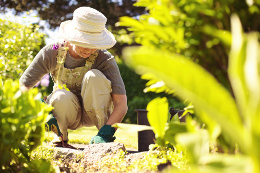How would you react when someone told you to adopt a slow approach in your life. Your first reaction, if I am guessing it right, would be 'is something wrong?'. Well it's natural to have such reactions as in this fast paced world the word 'slow' has been completely eliminated from everybody's dictionary. Here we share a new concept in gardening - slow gardening, which is becoming a trend.

My first thought, when I heard of slow gardening was overgrown grass, unkempt garden and of course, not following the 101 ways to beautify your garden. But when I read about the pioneer of slow garden, Mr. Felder Rushing and his newly found concept I really liked his approach. His approach of relaxing and evaluating your comfort zone really clicked with many of us. Slow gardening is not procrastinating your duties as a gardener or passive gardening. It involves use of understanding the seasonal rhythms, starting from a scratch with planting and understanding the nature rather than following conventional gardening methods.
Can We Really Slow Down?
- Slow gardening embraces qualities like self awareness, personal responsibility and caring for the environment.
- Basically, it is totally opposite from conventional gardening techniques which involve a particular way which should be followed to achieve well kept garden.
- As people have taken every chore to be a responsibility which has to be finished, slow gardening provides relief by not taking gardening as a responsibility but enjoying the work.
- The policy of doing everything in an instant where people want fast results even if it means uprooting a tree from a nursery and planting it into garden just to give a complete look is something which is not suitable.
- Instead of uprooting a tree why not plant a seed and let it grow on its own pace. This way has actually been practiced by many of us and has produced wonderful results.
I remember my mother planning a kitchen garden where she had planted seeds of tomatoes, green chillies and coriander leaves. Even though it took time for tomatoes to become ripe, it was fun and relaxing. But when we followed fast gardening technique where we transplanted a tree it took many years to grow as the roots were damaged. So slow gardening was something which we preferred even though we had to start from scratch but we understood that nature took its own sweet time.
Origin of the Term
Slow gardening is a borrowed term that had evolved from the concept of slow food coined by
Carlo Petrini in 1986 who was promoting use of local ingredients harvested in an environmental way. The basic idea behind this concept was creating interest in slow foods rather than opting for fast foods which were unhealthier to eat. Also encourage growing of foods and enhance interest of present generations in preserving the concept of cooking and presentation methods as stated by their respective society. Slow gardening means planting young plants, saplings, cuttings or grafts and seeds, and relaxing the changing features of garden as it grows from infant to a mature one. The establishment of instant garden which required to be fed with chemical compounds was completely avoided. Also, enhanced use of Eco-pest control methods rather than chemical pest control methods are used.
Slow gardening does not mean organic gardening but growing what you like to enjoy and would love to take care of in the near future. It's not a check lists which has to be completed by a given deadline but it's using more of hands on approach and encouraging creativity in you. Like slow cooking is considered as the best cooking in which all the flavors come out and are more appetizing than ready to eat food available in the market. As slow cooking methods preserve vitamins, aromas and minerals so does slow gardening preserve the plants by helping them grow at their own rate.
This type of gardening doesn't promote show gardens but gardens accentuating convenience of the gardener. As we tend to look into our watches and effectively decide on the time we spent in our chores, this chore should have no time dedication but more of will dedication. So try to plant what you really like rather than a conventional landscape design. In the end, it is time we really take things slowly for a change.






 My first thought, when I heard of slow gardening was overgrown grass, unkempt garden and of course, not following the 101 ways to beautify your garden. But when I read about the pioneer of slow garden, Mr. Felder Rushing and his newly found concept I really liked his approach. His approach of relaxing and evaluating your comfort zone really clicked with many of us. Slow gardening is not procrastinating your duties as a gardener or passive gardening. It involves use of understanding the seasonal rhythms, starting from a scratch with planting and understanding the nature rather than following conventional gardening methods.
My first thought, when I heard of slow gardening was overgrown grass, unkempt garden and of course, not following the 101 ways to beautify your garden. But when I read about the pioneer of slow garden, Mr. Felder Rushing and his newly found concept I really liked his approach. His approach of relaxing and evaluating your comfort zone really clicked with many of us. Slow gardening is not procrastinating your duties as a gardener or passive gardening. It involves use of understanding the seasonal rhythms, starting from a scratch with planting and understanding the nature rather than following conventional gardening methods.